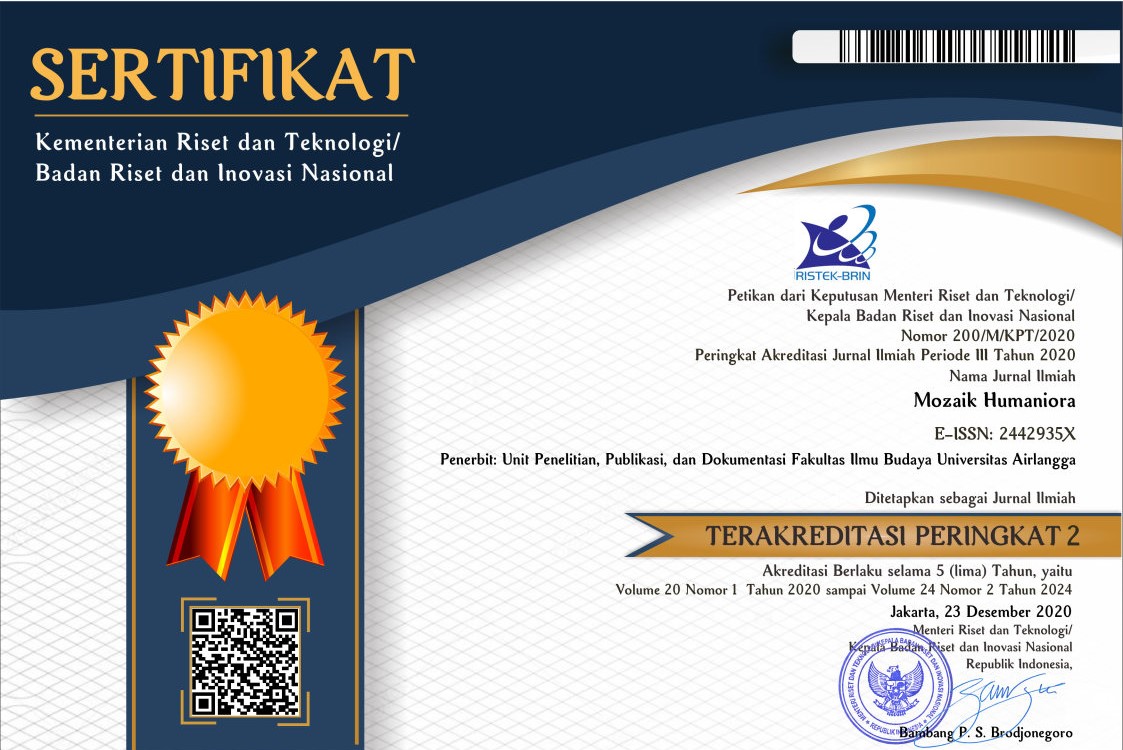Ngaben di Krematorium pada Masyarakat Hindu di Bali: Perspektif McDonaldisasi dan Homo Complexus
Downloads
Abstrak
Artikel ini adalah hasil penelitian kualitatif memanfaatkan paradigma kritis yang terfokus pada dua masalah, yakni latar belakang orang Bali memilih secara sukarela ngaben (kremasi) di krematorium dan bentuk pelaksanaannya. Informan ditunjuk secara purposif, yakni pengelola krematorium, pelaku ritual ngaben, tokoh agama, dan lain-lain. Teknik pengumpulan data adalah wawancara mendalam, observasi, dan studi dokumen. Analisis data mengikuti langkah-langkah, yakni konseptualisasi, hasil konseptualisasi, pembuktian, dan objektivasi. Hasil penelitian menunjukkan bahwa latar belakang orang Bali secara sukarela memilih ngaben di krematorium berkaitan dengan pemberlakuan asas McDonaldisasi, yakni efisiensi, daya hitung, prediksi, dan kontrol. Kondisi ini diperkuat oleh kemampuan pengelola krematorium untuk mempertahankan dimensi manusia sebagai homo complexus. Kombinasi antara McDonaldisasi dan esensi manusia sebagai homo complexus merupakan alasan maknawi bagi orang Bali untuk memilih alternatif ngaben secara sukarela pada krematorium. Ngaben di krematorium mengikuti tata aturan menurut agama Hindu. Dengan cara ini roh orang yang diaben mencapai status dewa pitara. Dewa pitara dipuja pada pura keluarga guna memberikan kesejahteraan bagi keluarga yang memujanya.
Kata kunci: homo complexus, masyarakat Hindu Bali, McDonaldisasi, krematorium, ritual kematian
Abstract
This article is the result of qualitative research with critical paradigm. This research focused on two issues: the background of Balinese people voluntarily choosing a crematorium to do cremation or ngaben and the way of its implementation. The informants of this research were the manager of the crematorium, the actors of cremation ritual, the religious leaders, etc. The data collection techniques were interview, observation and document study. The data analysis followed the steps of conceptualization, the results of conceptualization, verification, and objectivation. The results showed that the background of the Balinese people voluntarily to choose cremation in a crematorium relates to the application of the principles of McDonaldization, such as efficiency, calculability, standardization, and control. This condition is strengthened by the ability of the crematorium manager to maintain the human dimension as homo complexus. The combination of McDonaldization and the human dimension as homo complexus is a meaningful reason for Balinese to choose crematorium in doing ngaben voluntarily. Ngaben at the crematorium follows the same rules according to Hindu religion. In this way the spirit of the dead people could achieve the status of Dewa Pitara. Dewa Pitara is worshiped in the family temple in order to give blessing to the whole family members.
Keywords: Balinese Hindu society, crematorium, death ritual, homo complexus, McDonaldization

Mozaik Humaniora is licensed under a Creative Commons Attribution-ShareAlike 4.0 International License. Both authors and Mozaik Humaniora agree with the following attribution of journal:
1. Copyright of this journal is possession of Author, by the knowledge of the Editorial Board and Journal Manager, while the moral right of the publication belongs to the author.
2. The journal allows the author(s) to retain publishing rights without restrictions
3. The legal formal aspect of journal publication accessibility refers to Creative Commons Attribution Share-Alike (CC BY-SA).
4. The Creative Commons Attribution Share-Alike (CC BY-SA) license allows re-distribution and re-use of a licensed work on the conditions that the creator is appropriately credited and that any derivative work is made available under "the same, similar or a compatible license”. Other than the conditions mentioned above, the editorial board is not responsible for copyright violation.


















